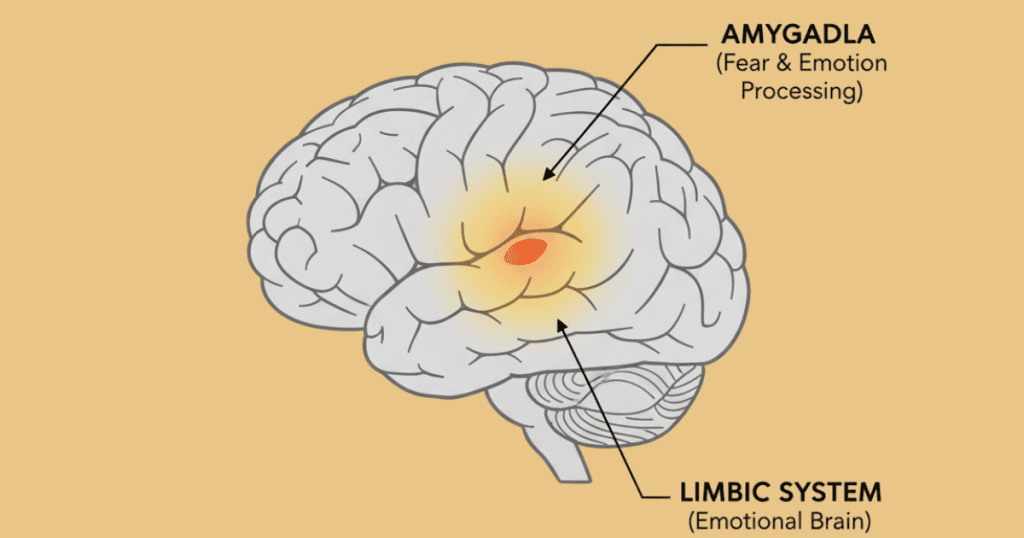There I was, standing in the garage rummaging through old boxes as a song drifted unexpectedly from the radio.
It has a gentle melody and striking lyrics. And then, almost instantly, I felt it.
A shiver that raced down my spine, goosebumps bursting up my arms.
It startled me. Not just the physical reaction, but the sudden recognition that hit like a wave.
Why did this moment feel so charged? Why did something so simple trigger such a visceral response?
It turns out that the sudden wave of chills, often called frisson, is no accident.
It’s the body’s neurobiological reaction to something emotionally or sensorially meaningful.
It shows up when we hear a truth, see something beautiful, or feel safe for the first time in years.
In the context of surviving narcissistic abuse, this reaction carries even greater weight.
Because when your nervous system has spent years on high alert, you become finely attuned to emotional truth.
That doesn’t mean you’re fragile. It means you’re surviving and are sensitive because you had to be.
And now, that sensitivity is resurfacing, giving you goosebumps when truth finally hits home.
Table of Contents
What Frisson Really Is (and Why It’s Powerful)

The term frisson refers to a sudden rush of chills or goosebumps triggered by an intense emotional or sensory moment.
It might hit when you hear a triumphant chord in a song or a line of poetry that nails your soul.
Sometimes it’s a moment of truth you’ve denied for so long.
When frisson happens, your body releases dopamine, the same neurotransmitter that fuels anticipation and pleasure.
Your amygdala, the brain’s emotion center, and the nucleus accumbens, the reward hub, light up.
It’s a full-body signal that something deeply meaningful is happening, even if your logical mind can’t name it yet.
The body doesn’t lie. It reacts to resonance before cognition catches up.
For survivors of narcissists, this sensation hits harder because your system has been forced to track meaning at a cellular level.
Most people experience frisson when they’re moved by art or music.
Survivors feel it when they recognize truth, safety, or authenticity, things their bodies once had to question constantly.
One time, I was looking through old photos of my cousins, and one hit me. A snapshot of us laughing under a tree.
Instantly, chills. Because there was no manipulation in the frame, just joy.
My body said, “Finally, truth.”
That’s frisson in action: your body’s way of saying I remember what real feels like.
Trauma Heightens Sensitivity to Emotional Shifts

Living with a narcissistic mother and toxic siblings who thrived on control trained my brain into a constant state of surveillance.
I could tell, before a single word was spoken, whether I was about to be blamed or ignored.
The way her spoon hit the cup. The pause before his sigh. The subtle glance exchanged between them.
I learned to detect the tiniest cues like a trained analyst decoding a hostile signal.
That wasn’t paranoia. It was protection.
When you live under emotional unpredictability, your nervous system develops hypervigilance.
You start reading emotional microdata to stay safe, like tone changes, pacing, or silence length. It becomes instinctive.
That same neural tuning, however, doesn’t switch off when you leave the environment.
It remains, like a sensitive radar, scanning for emotional frequencies.
Now, after leaving the abuse, that radar starts catching different kinds of signals, like truth, safety, and compassion.
And the body reacts just as strongly.
The difference? It doesn’t pick up danger anymore, but genuine emotion.
That’s why you might cry during an honest conversation or get goosebumps when your therapist says, “It wasn’t your fault.”
Your nervous system recognizes safety with the same intensity it once recognized threat.
I remember when my husband gently said, “You don’t need to defend yourself right now.”
My entire body froze, and then a wave of chills ran down my arms.
For years, I had been attacked for merely existing, so hearing the calm truth was almost foreign.
My system reacted before I could reply.
That’s how survivors’ bodies speak: through chills, shivers, or the sudden urge to breathe deeply.
That’s not a weakness. It’s rewiring.
Why Goosebumps Are a Body’s Way of Saying “This Matters”

Those goosebumps aren’t fear, but recognition. They’re your body whispering, “I know this. This is real.”
When I found one of my narcissistic mom’s old recipe cards, the same mother who could turn affection into ammunition, it said, “You are loved.”
Her handwriting was looped and uneven.
My chest tightened and I felt goosebumps crawl up my arms.
She never said those words in person, but my body responded to the echo of what could have been.
It wasn’t nostalgia. It was the nervous system acknowledging grief, love, and loss all at once.
This happens because emotional truth activates the parasympathetic nervous system, the part that restores calm.
When it activates, your heart rate adjusts, blood flow shifts to your skin, and you feel chills.
Your body is saying, “You’re safe enough to feel this deeply now.”
Many survivors confuse this with anxiety because they’re not used to feeling intensity without threat.
But this is your emotional system finally stretching after years of being locked in defense mode.
That’s why people cry when a lyric hits or when silence feels peaceful.
Once, during a quiet car ride with my dad, a song came on. Halfway through, he softly said, “You’ve carried too much for too long.”
My skin tingled. Goosebumps. My throat burned with held tears.
Because finally, my body recognized the difference between chaos and compassion.
The Science of Survival and Sensitivity

Let’s dissect this from a tactical neuroscience standpoint.
Prolonged trauma reshapes the limbic system, amygdala, and prefrontal cortex.
In narcissistic households, the amygdala becomes overactive, constantly scanning for emotional danger.
The prefrontal cortex works overtime trying to predict and control outcomes.
Meanwhile, dopamine pathways get rewired, linking unpredictability with heightened arousal.
That’s why survivors often feel more deeply, even decades later.
Research shows that frisson is connected to empathy and emotional intelligence.
A study found that frequent frisson is linked to stronger activity in brain areas tied to empathy and imagination.
That’s not a coincidence. It’s compensation.
Your nervous system adapts by becoming emotionally perceptive. You literally feel the world in higher resolution.
This trait, once forged in survival, becomes a superpower in narcissistic abuse healing.
Survivors often excel in creativity, emotional analysis, and relational insight.
You can read rooms faster, sense emotional incongruence immediately, and connect deeply to art or beauty.
That’s not oversensitivity. It’s emotional intelligence sharpened by endurance.
I once stood in my cousin’s garden, listening as she read aloud a poem she’d written about freedom.
Halfway through, I felt goosebumps. Not just from her words, but from the realization that I, too, was finally free.
My body didn’t need a therapist’s note to confirm it. It already knew.
From Trauma Response to Emotional Awakening

The same mechanism that once scanned for danger can now scan for beauty.
That’s the remarkable transformation of healing. It’s not about silencing your sensitivity, but redirecting it.
You learned to detect falseness. Now you get to detect authenticity.
You learned to read threats. Now you get to read the truth.
One evening, I sat on the porch with my husband.
He reached for my hand and said, “You did the right thing setting boundaries with your sister.”
For a split second, my old programming kicked in: guilt, tension, fear. Then, slowly, my body relaxed. Goosebumps.
That’s what emotional awakening feels like.
The same nervous system that once braced for attack now breathes through love.
When survivors start to experience beauty again, their bodies might tremble, cry, or shiver.
That’s not regression. That’s reintegration.
You’re not weak for feeling too much. You’re simply accessing the depth that narcissistic abuse tried to suppress.
It’s your body remembering its original programming: to feel, to connect, to live.
Reframe those goosebumps not as reminders of trauma but as milestones of awakening.
Each chill says, “I am here. I am alive. I can feel again.”
How to Honor Your Sensitivity Instead of Silencing It

You’ve spent years silencing instinct. Now it’s time to honor it strategically.
- Choose depth over distraction. Listen to music that moves you, not just fills silence. When chills come, pause and feel them. They mean you’re safe enough to feel. I even replay the songs my mother once mocked. I reclaim them now, one by one.
- Ground the body when frisson hits. When the wave rises, pause. Breathe, feel your feet and pulse. Don’t analyze. Anchor. This re-trains your body to link deep emotion with safety.
- Create micro-sanctuaries. You don’t need rituals, just small, safe spaces for emotion. Mine’s my dad’s courtyard garden. I journal, and when goosebumps hit mid-sentence, I know I’ve touched truth.
- Reframe sensitivity as a strategy. You’re not “too sensitive.” You’re perceptive. Your body reads emotional truth fast. Use it as a compass for peace, sincerity, and alignment.
- Surround yourself with authenticity. Be with people who don’t make you earn love. Let your body relearn, over time, that safety can be unconditional.
Sensitivity isn’t a burden.
It’s your nervous system re-entering the world on its own terms. Stronger, sharper, and beautifully aware.
The Beauty of a Body That Still Knows How to Feel

Surviving narcissistic abuse often leaves people numb. Emotionally drained and distrustful of their own instincts.
But those goosebumps you feel now? They’re proof your body still knows how to register truth.
Still knows how to connect meaning with sensation. Still knows how to live.
My brother once mocked me for tearing up during a classical concert.
He sneered, “Why are you crying over a song?”
I smiled, because I knew what he didn’t: my tears weren’t weakness. They were evidence of recovery.
My goosebumps were my body whispering, “I survived.”
Those chills aren’t fragility. They’re proof of resilience.
They’re the body’s quiet declaration: “I am here, and I still know beauty when I see it.”
Every shiver, every tear, every chill is your nervous system reclaiming its original power.
The power to feel life deeply, freely, and without fear.
Related posts:
- 10 Nonverbal Abuse Tactics Narcissists Use to Control You
- How a Narcissist “Shows” Love (And Why It’s Actually Abuse)
- 12 Daily Habits That Keep You Sharp and Strong After Narcissistic Abuse
- Why People Judge You After Narcissistic Abuse (And Why Their Opinion Means Nothing)
- 7 Masks Narcissistic Abuse Trains You to Wear (And How I Dismantled Each One)


